 Paperless-ngx is a community-supported open-source document management system that transforms your physical documents into a searchable online archive so you can keep, well, less paper. Features: Organize and index your scanned documents with tags, correspondents, types, and more. Your data is stored locally on your server and is never transmitted or shared in any way. Performs OCR on your documents, adding searchable and selectable text, even to documents scanned with only images.
Paperless-ngx is a community-supported open-source document management system that transforms your physical documents into a searchable online archive so you can keep, well, less paper. Features: Organize and index your scanned documents with tags, correspondents, types, and more. Your data is stored locally on your server and is never transmitted or shared in any way. Performs OCR on your documents, adding searchable and selectable text, even to documents scanned with only images.
 A file searching tool, able to perform in-name and in-text matching, as well searching by file type and last modified time. It is also capable of performing indexing by using an mlocate database.
A file searching tool, able to perform in-name and in-text matching, as well searching by file type and last modified time. It is also capable of performing indexing by using an mlocate database.
 tlgu will convert an input_file from Thesaurus Linguae Graeca (TLG) and Packard Humanities Institute (PHI) representation to a Unicode (UTF-8) output_file which can then be read or searched using available pattern matching tools, like grep and awk. The TLG/PHI representation consists of "beta-code" text and citation information. The TLG / PHI and Epigraphical corpuses include the majority of classical Hellenic and Latin works and inscriptions. Several options are available, including splitting
tlgu will convert an input_file from Thesaurus Linguae Graeca (TLG) and Packard Humanities Institute (PHI) representation to a Unicode (UTF-8) output_file which can then be read or searched using available pattern matching tools, like grep and awk. The TLG/PHI representation consists of "beta-code" text and citation information. The TLG / PHI and Epigraphical corpuses include the majority of classical Hellenic and Latin works and inscriptions. Several options are available, including splitting
 jQuery UI widget for structured queries like "Contacts where Firstname starts with A and Birthday before 1/1/2000 and State in (CA, NY, FL)"...
jQuery UI widget for structured queries like "Contacts where Firstname starts with A and Birthday before 1/1/2000 and State in (CA, NY, FL)"...
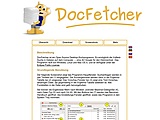 DocFetcher is an Open Source desktop search application: It allows you to search the contents of files on your computer. — You can think of it as Google for your local files. The application runs on Windows, Linux and Mac OS X, and is made available under the Eclipse Public License.
DocFetcher is an Open Source desktop search application: It allows you to search the contents of files on your computer. — You can think of it as Google for your local files. The application runs on Windows, Linux and Mac OS X, and is made available under the Eclipse Public License.
 Groonga is a fast and accurate full text search engine based on inverted index. One of the characteristics of Groonga is that a newly registered document instantly appears in search results. Also, Groonga allows updates without read locks. These characteristics result in superior performance on real-time applications. Groonga is also a column-oriented database management system (DBMS). Compared with well-known row-oriented systems, such as MySQL and PostgreSQL, column-oriented systems are more
Groonga is a fast and accurate full text search engine based on inverted index. One of the characteristics of Groonga is that a newly registered document instantly appears in search results. Also, Groonga allows updates without read locks. These characteristics result in superior performance on real-time applications. Groonga is also a column-oriented database management system (DBMS). Compared with well-known row-oriented systems, such as MySQL and PostgreSQL, column-oriented systems are more
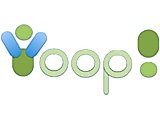 Yioop software provides many of the same features of larger search portals: Search Results. Yioop comes with a crawler that can be used to crawl the open web or a selection of URLs of your choice. It can index popular archive formats like Wikipedia XML-dumps, arc, warc, Open Directory Project-RDF (now Curlie.org), as well as dumps of emails or databases. Once you have created Yioop indexes of your desired data sources, Yioop can serve as a search engine for your data. It supports "crawl mix
Yioop software provides many of the same features of larger search portals: Search Results. Yioop comes with a crawler that can be used to crawl the open web or a selection of URLs of your choice. It can index popular archive formats like Wikipedia XML-dumps, arc, warc, Open Directory Project-RDF (now Curlie.org), as well as dumps of emails or databases. Once you have created Yioop indexes of your desired data sources, Yioop can serve as a search engine for your data. It supports "crawl mix
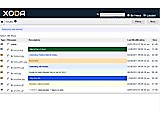 XODA is a DMS (Document Management System) written in PHP and using AJAX. Without a database backend it allows addition and editing of descriptions and filters for files and directories, as well as performing regular actions like copying, moving, renaming, and deleting. The project targets end users who want to organize all kinds of documents on a remote machine running a Unix-like operating system with Web server and PHP support. It is just a few files including compressed JavaScript, and store
XODA is a DMS (Document Management System) written in PHP and using AJAX. Without a database backend it allows addition and editing of descriptions and filters for files and directories, as well as performing regular actions like copying, moving, renaming, and deleting. The project targets end users who want to organize all kinds of documents on a remote machine running a Unix-like operating system with Web server and PHP support. It is just a few files including compressed JavaScript, and store
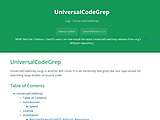 UniversalCodeGrep (ucg) is an extremely fast grep-like tool specialized for searching large bodies of source code. It is intended to be largely command-line compatible with Ack, to some extent with ag, and where appropriate with grep. Search patterns are specified as PCRE regexes.
UniversalCodeGrep (ucg) is an extremely fast grep-like tool specialized for searching large bodies of source code. It is intended to be largely command-line compatible with Ack, to some extent with ag, and where appropriate with grep. Search patterns are specified as PCRE regexes.
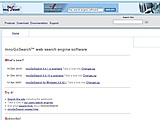 mnoGoSearch is an open source full-featured web search engine software.
mnoGoSearch is an open source full-featured web search engine software.
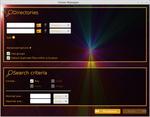 CloneManager allows to find duplicate files, and those which haven't been backed up. It may skip files based on size, and use directory structures for search grouping. It's implemented in Java and available in English and French.
CloneManager allows to find duplicate files, and those which haven't been backed up. It may skip files based on size, and use directory structures for search grouping. It's implemented in Java and available in English and French.
|